重要短语的用法及区别
初中英语重要短语用法及区别

初中英语重要短语用法及区别初中英语重要短语用法及区别我们在记忆单词的时候,面对易混淆的词语要注意分清。
下面是店铺整理的初中英语重要短语用法及区别,欢迎阅读!英语重要短语的用法及区别:find , look for,find out二者都有“寻找”的意思。
find是look for的结果。
What are you looking for ? 你在找什么?look for是find之前的寻找过程。
Have you found your pen ? 你找到你的钢笔了吗?Find out指经过一番努力最终找到。
I found out she was wrong.我发现她错了。
英语重要短语的用法及区别:whether,if这两个连词都作“是否”解,引导宾语从句时,两者通常可以互换。
但在下列几种情况下,不可用if 代替whether。
1)当whether 与or not连成词组时。
I don't know whether or not they will come for our help.我不知道他们是否来帮助我们。
2)whether 用在不定式前面时。
She hasn't decided whether to go or not.她还没有决定去还是不去。
3)whether引导的从句放在句首时。
Whether this is true or not,I can't say.这是不是真的,我不说(或我说不准)英语重要短语的用法及区别:date , daydate指"日期"。
What's the date today ? 今天几号?day指"星期几",指二十四小时的一整天;也单指白天;也指重要的日子.What day is today ? 今天星期几?There are seven days in a week . 一周有七天。
National Day 国庆节英语重要短语的用法及区别:join , take part in, join in二者都有“参加”的意思。
初中重要英语短语用法汇总
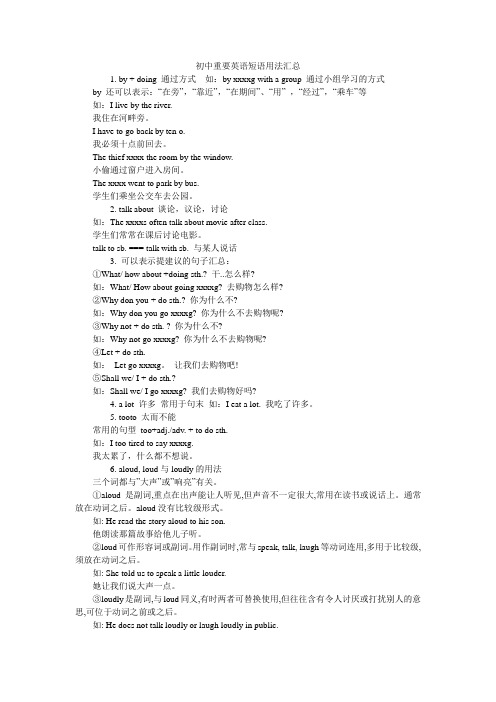
初中重要英语短语用法汇总1. by + doing 通过方式如:by xxxxg with a group 通过小组学习的方式by 还可以表示:“在旁”,“靠近”,“在期间”、“用” ,“经过”,“乘车”等如:I live by the river.我住在河畔旁。
I have to go back by ten o.我必须十点前回去。
The thief xxxx the room by the window.小偷通过窗户进入房间。
The xxxx went to park by bus.学生们乘坐公交车去公园。
2. talk about 谈论,议论,讨论如:The xxxxs often talk about movie after class.学生们常常在课后讨论电影。
talk to sb. === talk with sb. 与某人说话3. 可以表示提建议的句子汇总:①What/ how about +doing sth.? 干..怎么样?如:What/ How about going xxxxg? 去购物怎么样?②Why don you + do sth.? 你为什么不?如:Why don you go xxxxg? 你为什么不去购物呢?③Why not + do sth. ? 你为什么不?如:Why not go xxxxg? 你为什么不去购物呢?④Let + do sth.如:Let go xxxxg。
让我们去购物吧!⑤Shall we/ I + do sth.?如:Shall we/ I go xxxxg? 我们去购物好吗?4. a lot 许多常用于句末如:I eat a lot. 我吃了许多。
5. tooto 太而不能常用的句型too+adj./adv. + to do sth.如:I too tired to say xxxxg.我太累了,什么都不想说。
6. aloud, loud与loudly的用法三个词都与”大声”或”响亮”有关。
九年级英语上册 Unit7 重点词汇短语及用法

九年级英语上册 Unit7 重点词汇短语及用法课件www.5yk九年级英语上册Unit7重点词汇短语及用法一、Besides与Except:这对单词的用法大不相同。
、besides:用于肯定句时意思是:“除了……外还有”用于否定句时意思是:“除了……外”可以替换为except.Eg:①Therearemanygirlstherebesidesme.除了我以外,那里还有很多女孩。
(包括me)②whatdidyouwantbesidesthese?除了这些东西外,你还要什么?(包括these)③Haveyounoclothesbesidesthose?除了那些衣服外,你没有衣服了吗?(此时besides可以替换为except)2、except:“除了……外”(……不包括在内)。
Eg:①IgotoschooleverydayexceptSunday.除星期天之外,我天天上学。
②Nobodycameexceptme.除了我之外没人来。
二、But与Except:这对单词的意义相近,但用法上有以下区别:、but通常只与next,last,no,anwhere,everything以及who,where,what等疑问词连用,所以其他的情况一般用except.Eg:①Iknowthemallbutone.我只差一个就全认识了。
②whobutafoolwoulddosuchathing?除了傻瓜谁会做出这样的事情来?2、but强调意义的几乎完整性,except相比之下更强调后面的例外。
Eg:①Ihavereadallthebooksbutone.只差一本这些书我都看完了。
②Ihavereadallthebooksexceptone.我还有一本书没看完。
三、Exceptfor与Except.这两个词的意义相近,但用法上有以下区别:、except多用于前后有对应词语的句子中,exceptfor多用于前后没有对应词语的句子中.Eg:①yourpictureisgoodexceptforsomeofthecolours.你的画很好,除了有些颜色不好。
人教版八年级下册英语复习 Unit 4 重要短语、句型、重点讲解及作文范文

人教版八年级下册英语 Unit 4重要短语、句型、重点讲解及作文范文Unit 4 Why don’t you talk to your parents?一、重点短语1. have free time有空闲时间2. allow sb. to do sth. 允许某人做某事3. hang out with sb. 与某人闲逛4. after-school classes课外活动课5. get into a fight with sb. 与某人吵架/打架6. until midnight直到半夜7. talk to sb. 与某人交谈8. too many太多9. study too much学得过多10. get enough sleep有足够的睡眠11. write sb. a letter给某人写信12. call sb. up打电话给某人13. surprise sb. 令某人惊讶14. look through翻看15. be angry with sb. 生某人的气16. a big deal重要的事17. work out成功地发展;解决18. get on with不11睦相处;关系良:19. fight a lot经常吵架/打架20. hang over笼罩21. refuse to do sth. 拒绝做某事22. offer to do sth. 主动提出做某事23. so that以便24. mind sb. doing sth. 介意某人做某事25. all the time一直26. in future今后27. make sb. angry使某人生气28. worry about sth. 担心某事29. copy one’s homework抄袭某人的作业30. be oneself做自己31. family members32. spend time alone独自消磨时光33. give sb. pressure给某人施压34. have a fight with sb. 与某人吵架35. compete with sb. 与某人竞争36. free time activities业余活动37. get better grades取得更好的成绩38. give one’s opinion提出某人的观点39. learn exam skills学习应试技巧40. practice sports体育训练41. cause stress造成压力42. cut out删除第1页共12页二、重点句型1. I studied until mid night last night so I didn’t get enough sleep.我昨晚学习到半夜所以睡眠不足。
英语最重要的70个固定短语和用法

英语最重要的100个固定短语和用法(含例句)1.agree with 同意……的意见(想法);符合I can’t agree with you about that.就那件事,我无法同意你的看法。
2.listen to倾听……When she arrived,I was listening to English.她来的时候,我正在听英语。
3.get to 到达I get to school at about 7:30 every day,and I get home at 5:00 in the afternoon.我每天7:30到校,下午5:00到家。
4.fall off (从……) 掉下The girl fell off the bike.女孩从自行车上摔了下来。
5.knock at/on 敲(门、窗)There was a heavy knock at the door.有人在猛烈地敲门。
6.laugh at 嘲笑It’s not good to 1augh at a person who is in trouble.讥笑一个陷于困境的人是不对的。
7.learn…from… 向……学习Bob,you should learn from your brother.He does well in his homework.鲍勃,你应该向你哥哥学一学。
他的作业完成得很好。
8.live on 继续存在;靠……生活People in my hometown live on rice.我家乡的人们靠大米为生。
9.look after 照顾,照看I must look after my old grandma when my parents are not at home.父母不在家时,我必须照顾我的老奶奶.10.help…with 帮助……做……My friend helps me with my English study.我的朋友帮助我学习英语。
中考重点常见词汇和短语的用法
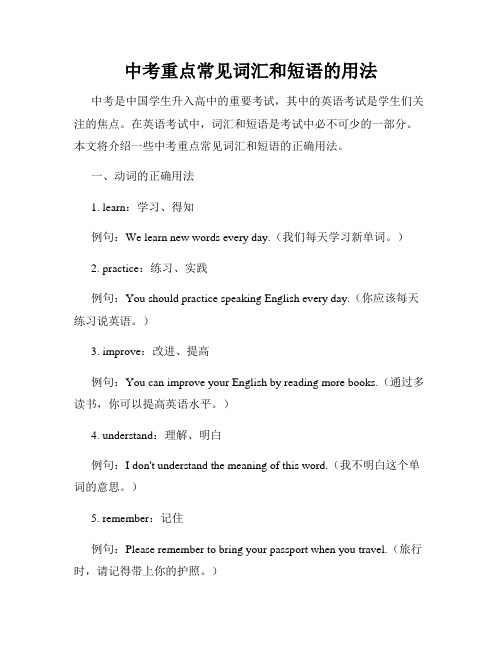
中考重点常见词汇和短语的用法中考是中国学生升入高中的重要考试,其中的英语考试是学生们关注的焦点。
在英语考试中,词汇和短语是考试中必不可少的一部分。
本文将介绍一些中考重点常见词汇和短语的正确用法。
一、动词的正确用法1. learn:学习、得知例句:We learn new words every day.(我们每天学习新单词。
)2. practice:练习、实践例句:You should practice speaking English every day.(你应该每天练习说英语。
)3. improve:改进、提高例句:You can improve your English by reading more books.(通过多读书,你可以提高英语水平。
)4. understand:理解、明白例句:I don't understand the meaning of this word.(我不明白这个单词的意思。
)5. remember:记住例句:Please remember to bring your passport when you travel.(旅行时,请记得带上你的护照。
)二、名词的正确用法1. exam:考试例句:I have an English exam tomorrow.(我明天有一场英语考试。
)2. grade:年级、分数例句:He is in the fifth grade.(他在五年级。
)3. subject:科目例句:Math is my favorite subject.(数学是我最喜欢的科目。
)4. book:书例句:I borrowed a book from the library.(我从图书馆借了本书。
)5. knowledge:知识例句:Reading can broaden our knowledge.(阅读可以扩大我们的知识面。
)三、形容词和副词的正确用法1. difficult:困难的例句:This math problem is difficult to solve.(这个数学问题很难解。
初一重要知识归纳常见短语的用法总结

初一重要知识归纳常见短语的用法总结初一重要知识归纳:常见短语的用法总结在初一年级学习英语的过程中,学生们需要积累掌握各种常见短语的用法。
这些短语在日常交流和书面表达中经常出现,理解和正确运用它们是提升语言能力的重要一步。
本文将总结初一英语中常见短语的用法,帮助同学们更好地掌握这一知识点。
1. call up"Call up"这个短语在生活中的用法非常广泛,可以有以下几种意思:a) 打电话给某人:I will call up my friend tomorrow to invite her to my birthday party.b) 召集(某人)参军:Many young men were called up during the war.c) 想起,回忆起:The sight of the old house calls up memories of my childhood.2. look after"Look after"意为照顾、照看,常用于描述关心他人或照顾某物的行为。
以下是几个例句:a) My sister looks after the baby while our parents are at work.b) Could you please look after my bag for a moment? I need to use the restroom.c) Don't worry, I will look after your garden while you're on vacation.3. get along with"Get along with"这个短语通常用于描述人际关系,意为与某人相处融洽。
以下是一些例句:a) Tommy is very friendly and gets along with everyone in his class.b) It's important to learn how to get along with your classmates at school.c) Sarah and her brother used to argue a lot, but now they get along much better.4. put on"Put on"是一个多义短语,可以表示穿上衣物、增加体重、戴上帽子等。
高中英语必修二unit 1 重点单词短语及用法,有例句

一.重要词汇拓展adj.文化的→culture n.文化,文明adj. 稀罕的,稀有的,珍贵的→ rarely adv.adj.贵重的,有价值的→ value n.价值→invaluable/ priceless adj.无法估价的,非常贵重的→valueless/ worthless adj.无价值的4. survive v.幸免,幸存,生还→survival n.幸存,生还→survivor n.生还者vt.使吃惊;惊讶→amazed adj.感到惊讶的→amazing adj.令人惊讶的→amazement n.惊讶vt.挑选,选择→selection n.n.设计,图案,构思 vt.设计,计划,构思→designer n.设计者adj.奇特的,异样的 vt.想像,设想,爱好vt.装饰,装修→decoration n.装饰,装修n.[C]珠宝,宝石→jewellery/jewelry n.[U]n.接待,招待会,接收→receive v.接待,接受,收到v.移动,搬开→removal n.移动,迁移n./vt.怀疑,疑惑adj.值得的,值……→(同义词)worthy.价值n.根据,证据→evident adj 明显的,显而易见的二.重点短语梳理search of 搜寻,寻找to 属于return 作为报答war 处于交战状态than 少于apart 拆开highly of 看重,器重三.重点词汇及用法讲解1. rareThis species of plant is becoming rare.这种植物越来越罕见2. valuableThe burglar stole some valuable books.窃贼偷走了一些值钱的书3. it 做形式主语和形式宾语It’s very important to master the skills of computer.掌握计算机技能非常重要He found it not easy to get along well with her.他发现和她相处好并不容易4. surviveOnly 12 of the 140 passengers 名乘客中只有12名生还He survived his wife by ten years.他比妻子多活了十年There are concerns that the beggars in the street may not survive the severe winter.人们有些担心大街上的乞丐可能会熬不过这个寒冷的冬天5. in search ofI look everywhere in search of my glasses.我到处找我的眼镜He went to the south in search of a better job.他去南方寻找更好的工作6. amazeYour great progress will amaze everyone.你的巨大进步会让每个人吃惊My younger sister has an amazing talent in dance.我妹妹在舞蹈方面有惊人的才华We were amazed to find that no one was hurt.我们很惊异的发现竟没有人受伤7. selectI selected four postcards and handed them to the cashier.我挑选了4张明信片,递给收银员Some changes have been made to the computer’s basic design.计算机的基本设计有了一些改变8. designA local engineer designed the theatre.一位当地的工程师设计了这座剧院The course is designed for beginners.这门课程是为初学者设计的The programme is designed to help people who have been out of work for a long time.这项计划的目的是为长期失业者提供帮助9. decorateWe decorated the christmas tree with lights.我们用灯来装饰圣诞树I’m going to decorate the bathroom next.接下来我要装修浴室10. belong toThose books belong to me.那些书是我的11. in returnYou gave me your watch and in return i gave you my book.你把手表给我了,作为回报,我把书送给你I sent him a present in return for his help我送给他一份礼物以答谢他的帮助.12. have sth doneI want to have my bicycle repaired我想找人修理我的自行车.The boy had his clothes washed.这个男孩让别人给他洗衣服13. less than no less than not less thanI drank no less than ten bottles of beer.我喝了多达10罐啤酒It’s not less than a mile to the station.到火车站至少有一英里路14. doubtDoubt is the key to the knowledge.怀疑是知识的钥匙There is no doubt that he will come back.毫无疑问,他会回来的I have some doubt whether my sister can be admitted to a university.I doubt whether/if he will keep his promise.I don’t doubt that he will keep his promise15. formerCompared with the former student, the latter one is more fluent in spoken English.和前一个学生相比,后者的英语口语更流利16. worthThe museum is well/really worth a visit.这家博物馆很值得参观It’s worth taking your time when your visit the church.你值得花时间参观这座教堂17. apartWe are living apart now.我们现在不住在一起It’s easy to take the watch apart but difficult to put it together again.拆开手表很容易,但要再装起来就难了Apart from their apartment in Beijing, they’ve got a house in country.除了北京的公寓,他们在乡下还有一栋房子18. “疑问词+不定式”结构做主语,宾语,表语等How to do it is a question.怎样做是一个问题I don’t know which book to choose.我不知道应该买哪一本书My question is how to carry out the plan.我的问题是怎么实施这项计划19. evidenceWe found further scientific evidence for this theory.我们找到了进一步证实这种理论的科学依据There is some evidence that a small amount of alcohol is good for you.有证据显示,少量饮酒有益健康20. explodeThey had planned to blow up the bridge but their bombs failed to explode.他们原本计划炸掉这座桥,但炸弹没有爆炸21. think highly/ much/ well/ a lot/ little/ poor/ badly of ; speak highly/ well ofShe thought highly of him and his novels.她很看重他和他的小说He seemed to think highly of you.他好像对你评价很高。
重要短语固定搭配

restitution of sth. 归还某物 错误搭配:
admit
承认
admit to sth. admit (that) admit to sb. (that) admit (to) doing sth.
容许,允许 允许进入
admit of sth. 容许某事物 admit sb/sth (into/to sth)
the importance of sth. 错误搭配:
method of/for (doing) sth
prize sth.as sth.
recognize sth. as sth.
credit propose
把A归功于B 认为A有B
credit A to B be credited to (doing) sb/sth credit A with B 几个错误用法:
with/without difficulty adv.
potential
potential for (有)…的潜力或可能性 potential of sth./sb. XX的潜力 potential to do. Sth. 做…的潜力
research
作动词 作名词
apply
申请
research (into) sth.
research into/on research for sth.
apply to apply for
draw on
动用(资金、经 draw on/upon sth
take turns 轮流
take turns to do sth.
take turns (doing) sth.
take turns at doing sth. take turns with sb./sth. take turns about/on…
新人教版(2019)必修三 Unit1 核心词汇和重要短语的用法
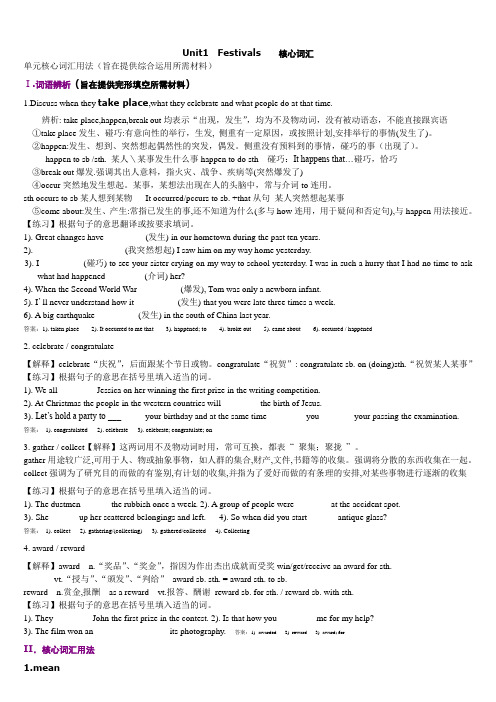
Unit1 Festivals 核心词汇单元核心词汇用法(旨在提供综合运用所需材料)Ⅰ.词语辨析(旨在提供完形填空所需材料)1.Discuss when they take place,what they celebrate and what people do at that time.辨析: take place,happen,break out均表示“出现,发生”,均为不及物动词,没有被动语态,不能直接跟宾语①take place发生、碰巧:有意向性的举行,生发, 侧重有一定原因,或按照计划,安排举行的事情(发生了)。
②happen:发生、想到、突然想起偶然性的突发,偶发。
侧重没有预料到的事情,碰巧的事(出现了)。
happen to sb /sth. 某人\某事发生什么事happen to do sth 碰巧:It happens that…碰巧,恰巧③break out爆发.强调其出人意料,指火灾、战争、疾病等(突然爆发了)④occur突然地发生想起。
某事,某想法出现在人的头脑中,常与介词to连用。
sth occurs to sb某人想到某物It occurred/pccurs to sb. +that从句某人突然想起某事⑤come about:发生、产生:常指已发生的事,还不知道为什么(多与how连用,用于疑问和否定句),与happen用法接近。
【练习】根据句子的意思翻译或按要求填词。
1). Great changes have_________ (发生) in our hometown during the past ten years.2). ____________________ (我突然想起) I saw him on my way home yesterday.3). I _________ (碰巧) to see your sister crying on my way to school yesterday. I was in such a hurry that I had no time to askwhat had happened ________ (介词) her?4). When the Second World War _________ (爆发), Tom was only a newborn infant.5). I’ ll never understand how it _________ (发生) that you were late three times a week.6). A big earthquake _________ (发生) in the south of China last year.答案:1). taken place 2). It occurred to me that 3). happened; to 4). broke out 5). came about 6). occurred / happened2. celebrate / congratulate【解释】celebrate“庆祝”,后面跟某个节日或物。
高中英语《代词、介词》重点短语用法复习资料
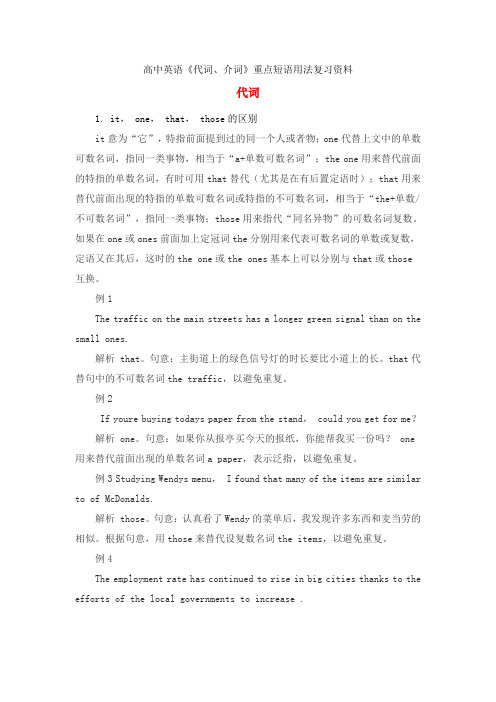
高中英语《代词、介词》重点短语用法复习资料代词1. it, one, that, those的区别it意为“它”,特指前面提到过的同一个人或者物;one代替上文中的单数可数名词,指同一类事物,相当于“a+单数可数名词”;the one用来替代前面的特指的单数名词,有时可用that替代(尤其是在有后置定语时);that用来替代前面出现的特指的单数可数名词或特指的不可数名词,相当于“the+单数/不可数名词”,指同一类事物;those用来指代“同名异物”的可数名词复数。
如果在one或ones前面加上定冠词the分别用来代表可数名词的单数或复数,定语又在其后,这时的the one或the ones基本上可以分别与that或those互换。
例1The traffic on the main streets has a longer green signal than on the small ones.解析 that。
句意:主街道上的绿色信号灯的时长要比小道上的长。
that代替句中的不可数名词the traffic,以避免重复。
例2If youre buying todays paper from the stand, could you get for me?解析 one。
句意:如果你从报亭买今天的报纸,你能帮我买一份吗? one 用来替代前面出现的单数名词a paper,表示泛指,以避免重复。
例3 Studying Wendys menu, I found that many of the items are similar to of McDonalds.解析 those。
句意:认真看了Wendy的菜单后,我发现许多东西和麦当劳的相似。
根据句意,用those来替代设复数名词the items,以避免重复。
例4The employment rate has continued to rise in big cities thanks to the efforts of the local governments to increase .解析 it。
point短语及用法point的用法总结大全

point短语及用法point的用法总结大全1.表示观点或意见:- In my point of view/opinion, this is the best solution.(依我看,这是最好的解决方案。
)- She made a good point about the advantages of studying abroad.(她对于出国留学的好处提出了一个很好的观点。
)2.表示目标或目的:- What is the point of all this hard work if we don't succeed?(如果我们不成功,这么辛苦工作的意义是什么?)- The main point of the meeting is to discuss the new project.(会议的主要目的是讨论新项目。
)- The point is to learn from our mistakes and improve.(重点是从错误中学习并改进。
)3.表示重要性或关键:- The point here is that we need to work together as a team.(这里的关键是我们需要作为一个团队合作。
)- The point I'm trying to make is that we should focus onthe positive aspects.(我想要表达的重点是我们应该关注积极方面。
)- The most important point is to never give up.(最重要的是永不放弃。
)4.表示指向或指出:- He pointed to the map and showed us where to go.(他指着地图告诉我们去哪里。
)- I pointed out the mistake in the report.(我指出报告中的错误。
one that 的用法区别
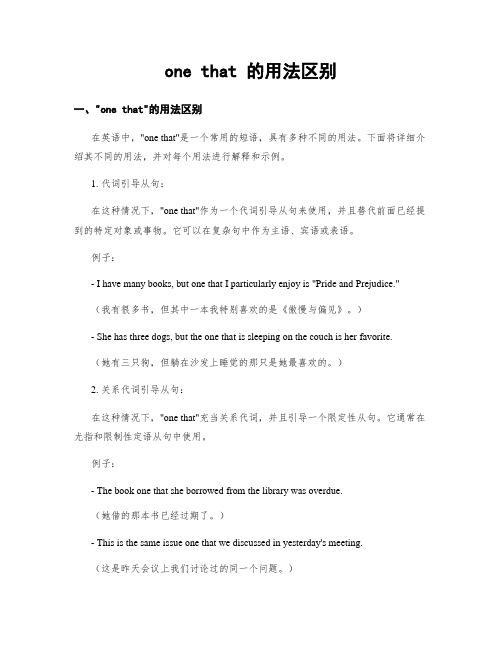
one that 的用法区别一、"one that"的用法区别在英语中,"one that"是一个常用的短语,具有多种不同的用法。
下面将详细介绍其不同的用法,并对每个用法进行解释和示例。
1. 代词引导从句:在这种情况下,"one that"作为一个代词引导从句来使用,并且替代前面已经提到的特定对象或事物。
它可以在复杂句中作为主语、宾语或表语。
例子:- I have many books, but one that I particularly enjoy is "Pride and Prejudice."(我有很多书,但其中一本我特别喜欢的是《傲慢与偏见》。
)- She has three dogs, but the one that is sleeping on the couch is her favorite.(她有三只狗,但躺在沙发上睡觉的那只是她最喜欢的。
)2. 关系代词引导从句:在这种情况下,"one that"充当关系代词,并且引导一个限定性从句。
它通常在尤指和限制性定语从句中使用。
例子:- The book one that she borrowed from the library was overdue.(她借的那本书已经过期了。
)- This is the same issue one that we discussed in yesterday's meeting.(这是昨天会议上我们讨论过的同一个问题。
)3. 特指某个具体的事物或人:在这种情况下,"one that"用于特指一个确定的事物或人,强调对其进行定义或区分。
例子:- The red dress is the one that she wore to the party.(那件红色连衣裙是她穿去参加派对的那件。
介词短语在句子中的重要性

介词短语在句子中的重要性介词短语在英语句子中起着重要的作用。
它们可以用来修饰名词、动词、形容词和副词,从而丰富句子的意思,使语言更加精确。
在本文中,我们将探讨介词短语在句子中的不同用法以及它们的重要性。
一、修饰名词:介词短语可以用来修饰名词,使句子更加清晰明了。
例如,"in the park"(在公园里)、"with a pen"(用一支钢笔)等。
这些短语可以提供额外的信息,帮助读者或听者更好地理解句子的含义。
二、修饰动词:介词短语也可以用来修饰动词,起到状语的作用。
例如,"run out of"(耗尽)、"look forward to"(期待)等。
这些短语可以改变动词的意思,使句子更加生动有趣。
三、修饰形容词和副词:除了修饰名词和动词,介词短语还可以用来修饰形容词和副词,帮助更准确地表达句子的含义。
例如,"happy with"(对...满意)、"too tired to"(太累以至于)等。
这些短语可以增强形容词和副词的程度或范围,使句子更加准确地传达信息。
四、介词短语的位置:介词短语的位置可以灵活变化,但要注意与所修饰的词保持逻辑上的一致性。
通常,介词短语位于所修饰的词的前面或后面。
例如,"Isaw a cat in the garden."(我在花园里看见了一只猫。
)和"I ran into him yesterday."(我昨天碰到了他。
)的介词短语分别位于名词和动词的后面。
五、常见的介词短语:在英语中,有许多常见的介词短语被广泛使用。
一些常见的介词包括"in"(在...里)、"on"(在...上)、"at"(在...处)等。
这些介词可以与不同的名词、动词、形容词和副词搭配使用,形成不同的短语。
初中英语重要短语的用法及区别(好)
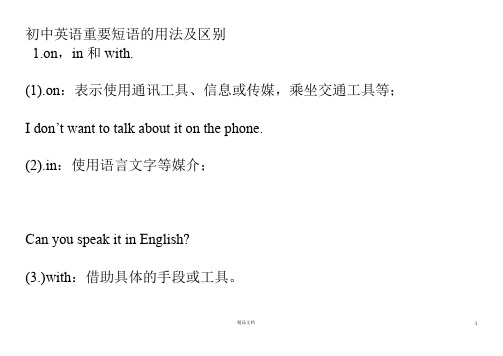
初中英语重要短语的用法及区别1.on,in和with.(1).on:表示使用通讯工具、信息或传媒,乘坐交通工具等;I don’t want to talk about it on the phone.(2).in:使用语言文字等媒介;Can you speak it in English?(3.)with:借助具体的手段或工具。
Don’t write it with a red pen.2.at , on , in三者都可以表示“在……的时候”。
(1)at:表示在哪个时刻用;表示时间点。
I get up at six o’clock in the morning . 我早晨六点起床。
(2)On:表示在哪一天,哪一天的早上(下午、晚上);on Wednesday , on Sunday morning , on May I , on a cold morning in 1936 (3)in:表示在哪一年(季、月),在上午,下午等。
in September , in the morning , in the afternoon3. spend, pay ,cost, take(1)Sb. Spend …on sth. 某人花了…(时间、金钱)在某事上。
I spend ten yuan on the book..(2)spend (in) doing sth. 某人花了…(时间、金钱)做某事。
She spent two hours in drawing the house.(3)Sb. pay …for …sth. 某人为某物花了…钱。
I paid 50 yuan for the clothes.(4)Sth. cost sb. …某物花了某人…钱。
It cost us five dollars.(5)It takes/took sb. …to do sth. 花了某人…(时间、金钱)做某事。
It takes us ten minutes to brush my teeth every day.4.too much, too many, much tootoo much + 不可数名词too many + 可数名词much too + 形容词、副词、(1)There is too much milk in the basket.(2) She ate too many biscuits yesterday morning.(3) He runs much too quickly.(4) The chair is much too expensive.5.not … until &untilnot …until 直到…才…(主句动词是短暂性动词)(1)He didn’t go to bed until his mother came back..until 一直到…(主句中使用延续性动词)(2)I study hard until it is midnight every day.6.few, a few; little , a little. 虽然都表示“少”,但·few, a few是可数的, little, a little是不可数的。
in to at的用法及区别
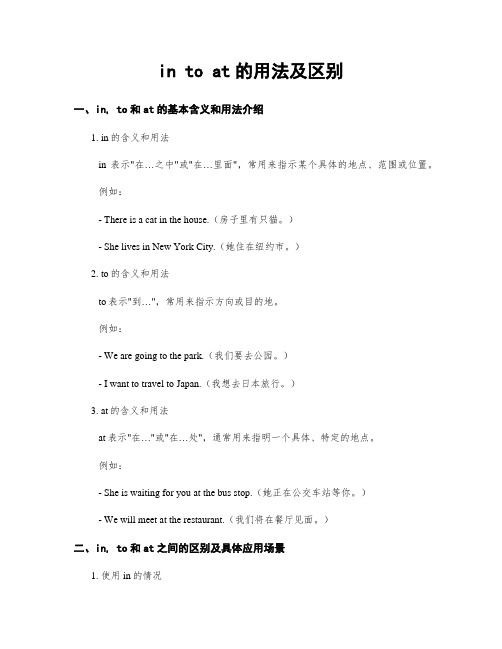
in to at的用法及区别一、in, to和at的基本含义和用法介绍1. in的含义和用法in表示"在…之中"或"在…里面",常用来指示某个具体的地点、范围或位置。
例如:- There is a cat in the house.(房子里有只猫。
)- She lives in New York City.(她住在纽约市。
)2. to的含义和用法to表示"到…",常用来指示方向或目的地。
例如:- We are going to the park.(我们要去公园。
)- I want to travel to Japan.(我想去日本旅行。
)3. at的含义和用法at表示"在…"或"在…处",通常用来指明一个具体、特定的地点。
例如:- She is waiting for you at the bus stop.(她正在公交车站等你。
)- We will meet at the restaurant.(我们将在餐厅见面。
)二、in, to和at之间的区别及具体应用场景1. 使用in的情况1) 表示位置:in后面通常接某个空间或范围名词。
例如:in the garden(在花园里)、in the sky(在天空中)2) 表示国家、城市等具体地点:例如:in China(在中国)、in London(在伦敦)3) 表示某种状态或情况:例如:in love(热恋中)、in trouble(陷入困境)2. 使用to的情况1) 表示动向或方向,通常用于表示移动、行驶等动作。
例如:go to school(去上学)、fly to Paris(飞往巴黎)2) 表示特定目的地或对象。
例如:give a present to my friend(给我的朋友送礼物)3. 使用at的情况1) 指明具体地点,强调位置。
例如:at the mall(在商场)、at the cinema(在电影院)2) 表示某个特定时间。
act重要短语的用法
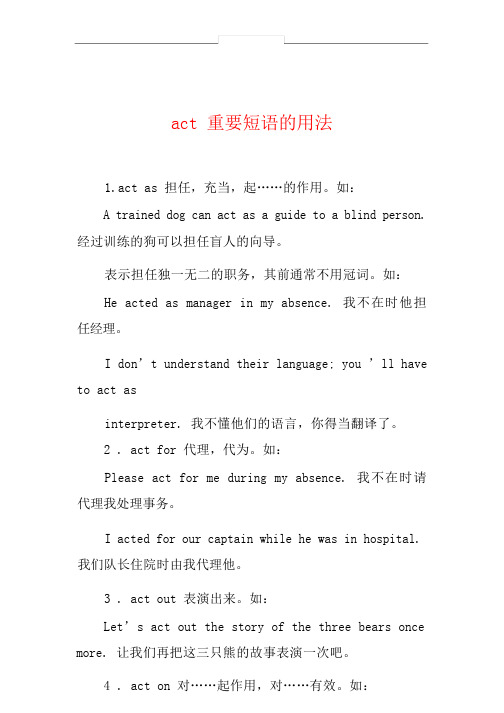
act 重要短语的用法1.act as 担任,充当,起……的作用。
如:A trained dog can act as a guide to a blind person. 经过训练的狗可以担任盲人的向导。
表示担任独一无二的职务,其前通常不用冠词。
如:He acted as manager in my absence. 我不在时他担任经理。
I don’t understand their language; you ’ll have to act asinterpreter. 我不懂他们的语言,你得当翻译了。
2 . act for 代理,代为。
如:Please act for me during my absence. 我不在时请代理我处理事务。
I acted for our captain while he was in hospital. 我们队长住院时由我代理他。
3 . act out 表演出来。
如:Let’s act out the story of the three bears once more. 让我们再把这三只熊的故事表演一次吧。
4 . act on 对……起作用,对……有效。
如:The drug acts on the stomach. 这药对胃有效。
Alcohol acts on the nervous system. 酒精对人的神经系统有影响。
5 . in the act 当场,正在动作时。
如:He was in the very act of starting. 他正准备动身。
He was caught in the act . 他被当场抓住。
- 1、下载文档前请自行甄别文档内容的完整性,平台不提供额外的编辑、内容补充、找答案等附加服务。
- 2、"仅部分预览"的文档,不可在线预览部分如存在完整性等问题,可反馈申请退款(可完整预览的文档不适用该条件!)。
- 3、如文档侵犯您的权益,请联系客服反馈,我们会尽快为您处理(人工客服工作时间:9:00-18:30)。
重要短语的用法及区别★bring , take , fetch , get , carry这几个动词都有“携带”、“运送”的意思。
但它们表示的动作方向不同。
bring是“带来”,从另外一个地方把东西带到说话的地方来。
例如:Don’t forget to bring a dictionary with you . 别忘了把辞典带来。
take是“带去”,从说话的地方把东西拿到另外的一个地方。
例如:Please take the small blackboard to the classroom 请把这块小黑板带到教室去。
fetch是“去取”,“去拿来”,从说话的地方出发到另外一个地方,然后将东西拿到说话的地方例如:Please fetch me some chalk .请给我拿些粉笔来。
carry表示运送,暗含东西“重”。
没有明确的方向。
例如:The bus can carry 30 passengers.这种公交车限乘30名乘客。
★spend,pay,cost,takeSb. spend …on sth. 某人花了…(时间、金钱)在某事上。
(in) doing sth. 某人花了…(时间、金钱)做某事。
Sb. pay …for sth. 某人为某物花了…钱。
Sth. cost sb. …某物花了某人…钱。
It takes/took sb. …to do sth. 花了某人…(时间、金钱)做某事。
★begin , start“开始”一般可以通用,但start较为口语化。
It has begun(started)raining . 已经开始下雨了。
Begin是普通用语,指开始某一动作或进程,其反义词是end.例如:New term begins on September 1st.新学期9月1日开始。
Start动作性较强,着重于开始着手这一点,带有突然开始的意思,其反义词为stop.还可表示“动身”、“开动”“出发”,“创办”,“开设”等意思,而begin则不能这样用。
例如:They start for Beijing tomorrow . 他们明天动身去北京。
★dress , have sth. on , wear , put on它们都有“穿”、“戴”的意思。
但用法不同。
have sth. on表示穿戴的状态。
He had a straw hat on . 他戴了一顶草帽。
wear表示穿戴的状态。
She likes to wear the light green dress . 她喜欢穿浅绿色的衣服。
put on表示穿戴的动作。
You’d better put on your overcoat before going out . 出门之前你最好穿上大衣。
dress既表动作也表状态。
The mother is dressing her baby . 母亲正给她的婴儿穿衣服。
★after , inAfter+时间段表达过去一段时间以后,常用于过去时态的句子;I received the letter after two days . 我是两天以后收到这封信的。
After+时间点表示将来一段时间以后,用于将来时态的句子。
He will arrive after four o’clock .in+时间段以现在为起点,表示将来一段时间以后,常用于将来时态的句子。
You will receive the letter in three days . 你三天以后将收到这封信。
★a number of ,the number ofa number of 意为“一些”、“许多”。
谓语动词常用复数形式。
例如:A number of people are waiting for the bus there.许多人在那里等公共汽车。
the number of 表示“......的数目”,作为句子的主语部分时,谓语动词用单数形式。
例如:The number of deer,nountain lions,and wild roses does not change much. 鹿、美洲狮和野玫瑰的数量并不起很大的变化。
★on,in和with.on:表示使用通讯工具、信息或传媒,乘坐交通工具等;I don’t want to talk about it on the phone.in:使用语言文字等媒介;Can you speak it in English?with:借助具体的手段或工具。
Don’t write it with a red pen.★at , on , in三者都可以表示“在……的时候”。
At:表示在哪个时刻用;I get up at six o’clock in the morning . 我早晨六点起床。
On:表示在哪一天,哪一天的早上(下午、晚上);on Wednesday , on Sunday morning , on May I , on a cold morning in 1936in:表示在哪一年(季、月),在上午,下午等。
in September , in the morning , in the afternoon★too much, too many, much tootoo much + 不可数名词too many + 可数名词much too + 形容词★few, a few; little , a little.虽然都表示“少”,但(1)few, a few是可数的, little, a little是不可数的。
(2)a few, a little含肯定意味,few, little含否定意味。
e.g. They have a little ink, don't they? 他们有一点墨水,是吗?They have little ink, do they? 他们几乎没有墨水,是吗?She has a few Chinese friends, doesn't she? 他有几位中国朋友,是吗?She has few Chinese friends, does she? 他几乎没有几位中国朋友,是吗?She has a little dog.她有一只小狗。
★can, be able to表示能力这一意义时can和be able to基本相同,但can只有两个时态即现在时(can)与过去时(could)而be able to有多种形式。
对未来的能力做决定时,一般用can. 用于过去时态时,be able to与can意义不完全相同,was able to意为“有这种能力,而且利用这种能力设法做成了某事”,而could只单纯地表达有某种能力。
★must, have tomust表示说话人的主观看法;而have to则表示客观需要。
mustn’t意为"不可以;不允许";don’t have to意为"不必"。
如:My father had to work when he was ten years old.The play is not interesting. I really must go now.★ago , beforeago立足于现在,表示从现在起,若干时间之前;ago 通常与一般过去时连用,不能与完成时连用;I met him three years ago .(距今)三年前,我遇到他。
before立足过去,表示从过去某一时刻起,若干时间以前。
before通常与过去完成时连用。
I had met him three years before .(距当时)三年前我见到他一次。
★alone, lonelyalone表示“单独,独自一个人,”强调客观状态,作表语或状语用。
Though I am alone , I am not lonely . 虽然我孤独一人,但我并不感到寂寞。
Lonely表示“孤独寂寞”,强调主观感觉,作定语和表语。
另外说明特点时还有“人迹稀少的”,“荒凉的”意思。
He was taken to a lonely house . 他被带到一个荒无人烟的房子内。
★also , either , too , as wellalso用于肯定句. You study English and I also study it . 你学英语,我也学。
either用于否定句,并放在句尾;You don’t study English and I don't study it either . 你不学英语,我也不学。
Too用于肯定句,位置通常在句末,前边常用逗号;也可用于句中,前后均有逗号。
You are a student and I am a student , too . 你是学生,我也是。
as well 用于肯定句,放在句尾,多用于口语。
例如:You know the way and I know it as well . 你知道路,我也知道。
★among , betweenbetween表示“两者”之间Do you know the difference between the two words ? 你知道这两个词有什么不同吗?among表示“三者或三者以上之间。
He is the most energetic boy among them . 他是他们中间精力最饱满的孩子。
★arrive , reach , get to三者都有“到达”之意。
reach为及物动词。
They reached Tianjin yesterday . 昨天他们到达天津。
arrive为不及物动词,后面接介词in或at。
到达的是大地方用in,小地点用at.get to常用于口语,可代替前二者。
表示到达时,如果地点是副词home, here, there, 就省略介词to.例如:When did you get here? 你什么时候到达这里的?★as , when , whileWhen:可与一个点的时间或表示一段的时间连用,从句动词可以是短暂性或延续性动词。
从句的动作和主句的动作可以同时,也同先于主句的动作;When the teacher came in , the students stood up . 当老师进来时,学生们起立。
While:只指一段时间,不能指一点时间。
因此while从句中的谓语动词必须是延续性动词。
表示一段较长的时间或一个过程,主句和从句的动作同时发生。
Don’t talk while you are eating . 吃饭时你不要说话。
As:主句和从句的动作同时发生,有时可译作“一边……,一边”。
